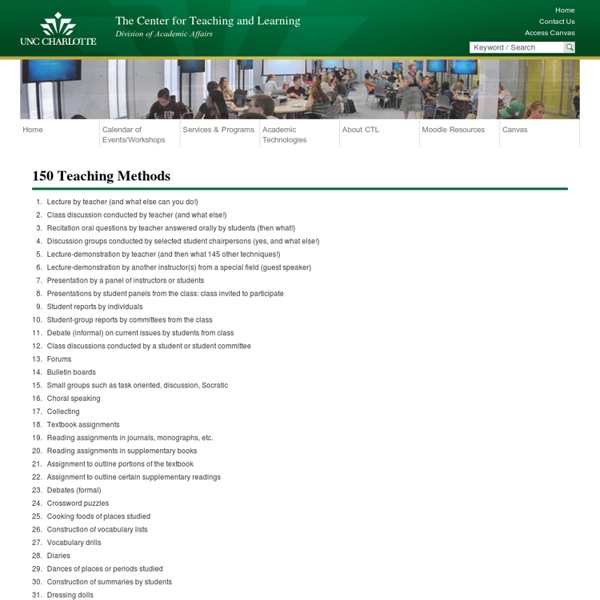Teaching and Assessment Strategies
Taking practice-based and literature-informed approaches, the CTL partners with Queen’s educators by providing expertise to enhance pedagogical practices, and provides educational leadership within the context of Canadian higher education. Teaching for Active Learning Teaching for Active Learning
6 Teaching Techniques You Should Know! - ExamTime
Education, as with other industries, has evolved in leaps and bounds in recent years. Traditional pedagogical techniques, based on a teacher explaining a topic and students taking notes, may still be useful on occasion, but education today revolves more around encouraging the student to awaken their curiosity and desire to learn. A number of different teaching techniques have emerged due to this change in education. Many of these teaching techniques are not actually new! The use of technology in the classroom has simply given education a new lease of life allowing us to approach old ideas in new ways.
Assessment and Rubrics
Learn more about our Online Courses, Online Certificate Programs, and Graduate Degree A collection of rubrics for assessing portfolios, group work/cooperative learning, concept map, research process/ report, PowerPoint, oral presentation, web page, blog, wiki, and other social media projects. Quick Links to Rubrics Social Media Project Rubrics
A Blog Assignment with Results - Faculty Focus
Blogging can be a tool that aids learning. “Blogs provide students with an opportunity to ‘learn by doing’ to make meaning through interaction with the online environment.” (p. 398) They provide learning experiences described as “discursive,” meaning students learn by discussing, which makes blogs a vehicle for knowledge construction.
The Names We Give to Our Instructional Strategies
Instructional strategies acquire names, labels that describe what the strategy involves—active learning, problem-based learning, cooperative learning. Sometimes the strategies gain popularity. They become widely used, and so do the terms that describe them. After a while teachers stop describing what they are doing in class. They simply refer to it by the label: “Yes, I have students work in groups. I use cooperative learning.”
20 Observable Characteristics Of Effective Teaching -
20 Observable Characteristics Of Effective Teaching by TeachThought Staff What makes an effective teacher? Or more specifically, what observable characteristics might you see and hear? The University of Minnesota offered some observable characteristics of effective teaching which, while focused on teacher actions rather than student learning, had some useful tips–not so much how to teach generally, but specific actions that you can use tomorrow. In “How A Good Teacher Becomes Great,” we theorized that good teachers “know which assessments are for “show,” and which are for “go”—that is, which look good from 10 feet, and which provide visibility for both the student and teacher where the learning needs to go next,” and that they model curiosity, collaborate with other great teachers, and “measure understanding in diverse ways.”
Three Strategies for Creating Meaningful Learning Experiences
Do you ever wonder whether your students care about your course material? Do you question whether your students appreciate how the information you address in class is relevant to them? Do you feel like there is often a mismatch between your intentions for your class and what your students actually want to learn?
10 Reasons Every Teacher Needs A Professional Learning Network -
10 Reasons Every Teacher Needs A Professional Learning Network by TeachThought Staff What’s a professional learning network?
Using Role Play Simulations to Promote Active Learning
Role play simulation is a form of experiential learning that allows you to “cover” the same sort of topics as you would in a lecture course while moving your students from passive to active learners. For example, I found success in using this model for a course in the domestic politics of foreign countries that I teach. Originally I lectured on political parties, election systems, leadership, major political issues, success and failure in politics in the UK.
The 10 Skills Modern Teachers Must Have
There’s been a lot of talk recently about what it means to be a learner in the 21st Century. Earlier this year, we put together a guide with skills important for students today. So, why not a list for educators, too?



